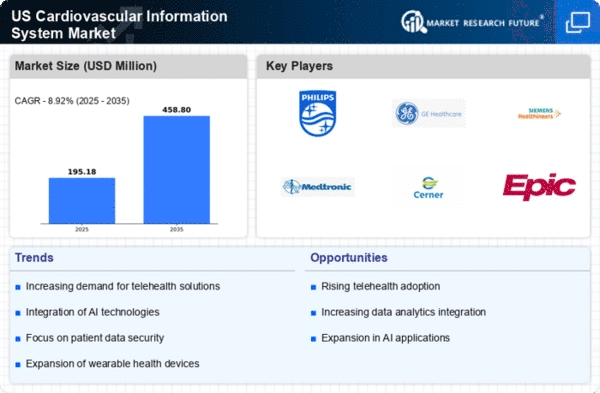Focus on Value-Based Care Models
The shift towards value-based care models is influencing the cardiovascular information-system market. Healthcare providers are increasingly held accountable for patient outcomes, prompting a need for systems that can track and analyze performance metrics. Cardiovascular information systems play a crucial role in this transition by providing data that supports quality improvement initiatives and enhances care coordination. As reimbursement models evolve to prioritize value over volume, the demand for robust information systems that can demonstrate improved patient outcomes is likely to grow. This trend indicates a significant opportunity for the cardiovascular information-system market to align with the changing landscape of healthcare delivery.
Government Initiatives and Funding
Government initiatives aimed at improving healthcare infrastructure are driving the cardiovascular information-system market. The US government has implemented various programs to promote the adoption of health information technology, including the Health Information Technology for Economic and Clinical Health (HITECH) Act. This act encourages healthcare providers to adopt electronic health records and other information systems, which are crucial for managing cardiovascular health. Additionally, funding opportunities for research and development in cardiovascular technologies are expanding. As a result, healthcare organizations are more likely to invest in cardiovascular information systems, enhancing their capabilities to deliver quality care and improve patient outcomes.
Technological Advancements in Healthcare
Rapid technological advancements in healthcare are significantly influencing the cardiovascular information-system market. Innovations such as artificial intelligence, machine learning, and big data analytics are transforming how cardiovascular data is collected, analyzed, and utilized. For instance, AI algorithms can predict patient outcomes and assist in personalized treatment plans, which is becoming increasingly vital in managing cardiovascular health. The market is projected to grow as healthcare providers adopt these technologies to enhance efficiency and improve patient care. The integration of advanced technologies into cardiovascular information systems not only streamlines operations but also supports better clinical decision-making, ultimately leading to improved patient outcomes.
Growing Demand for Remote Patient Monitoring
The increasing demand for remote patient monitoring solutions is shaping the cardiovascular information-system market. With a significant portion of the population managing chronic cardiovascular conditions, healthcare providers are seeking ways to monitor patients outside traditional clinical settings. Remote monitoring technologies allow for continuous tracking of vital signs and other health metrics, enabling timely interventions. This trend is likely to drive the adoption of cardiovascular information systems that can integrate remote monitoring data, providing healthcare professionals with comprehensive insights into patient health. As a result, the market is expected to expand as more providers recognize the benefits of remote monitoring in managing cardiovascular diseases.
Rising Prevalence of Cardiovascular Diseases
The increasing incidence of cardiovascular diseases in the US is a primary driver for the cardiovascular information-system market. According to the CDC, heart disease remains the leading cause of death, accounting for approximately 697,000 deaths annually. This alarming statistic underscores the urgent need for advanced information systems that can facilitate better diagnosis, treatment, and management of cardiovascular conditions. As healthcare providers seek to improve patient outcomes, the demand for sophisticated cardiovascular information systems is likely to rise. These systems enable the integration of patient data, streamline workflows, and enhance clinical decision-making, thereby addressing the growing burden of cardiovascular diseases in the US.
















